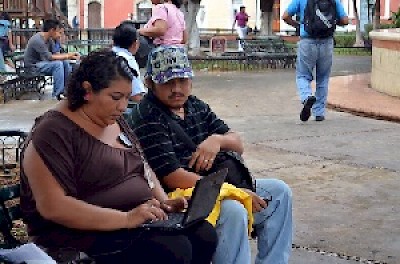Yucatan News: Marriage and Languages
Yucatan Prepared for Hurricanes
One of the most interesting things about the State of Yucatan is the way it goes about preparing for hurricanes. They don’t wait for a hurricane to hit and then try to scramble to find the resources necessary to recover. Instead, they figure out how many people are likely to need shelter and food, and make that happen. This year, the number of shelters increased from 35 to 50. They also don’t wait until the last minute to find trained personnel. Instead, they start workshops as early as March, ensuring that they will have a trained rescue workforce if and when the time comes. They have even held workshops with everyone from the local bakers to 13 consuls of foreign nations so that everyone will know how to be safe and get what they need if the worst happens. Nor do they wait for a hurricane to hit and then scramble to apply to the government for relief funds. At the present time, it is estimated that Yucatan has approximately $20 million pesos in a contingency fund for just in case a hurricane comes our way. Now, that is a job well done!
2013 Tunich Fair Numbers Are Coming In
The fair at Dzitya has pulled 40,000 visitors and nearly two million pesos. This is a craft fair that offers embroidery, hammocks, pottery, jewelry, and items carved from wood, stone and brass. To learn more about this fair, read Yucatan Living’s The Stones of Dzitya. Yucatan Living congratulates all of the artisans who make this a one-of-a-kind event! Don’t forget that many of these artisans live in Dzitya, you can also check them out on a regular basis.
Fifth Anniversary of the Honey Capital of the World
Sunday, August 10, 2013, was the fifth anniversary of Zaci’s appointment as the Honey Capital of the World. Zaci is located in the Municipality of Valladolid and has received this honor from the American Beekeeping Congress since 2009. Mark your calendars for this time next year and make it a point to be in Zaci for what we are certain will be their sixth anniversary as the Honey Capital of the World!
First Gay Couple Legally Married in Merida
Javier Alberto Carrillo Esquivel, 34, and Ricardo Arturo Gongora, 26, wore matching white guayabera shirts as they exchanged vows before the 400 guests in attendance. They were the first in the state to legally marry. Congratulations to the happy couple and to the State of Yucatan for recognizing and registering their marriage.
HIV-AIDS Education and Prevention in Yucatan
A new law has been passed in Yucatan. This one deals with HIV-AIDS and other STDs. At long last, there is now a law that establishes basic principles that ensure internationally recognized human rights, such as confidentiality, informed consent, social inclusion and non-discrimination, with respect to providing care to individuals who are living with these diseases. This gives the Departments of Health and Education the power to implement programs providing: information, prevention, protection, surveillance and the promotion of the use of both male and female condoms in sexual relationships. The Health and Education Departments are also required to sign cooperative agreements with academic and research institutions so that their staff can take advantages of updated courses and training in the care of those who are positive for HIV. In addition, the new law provides for mandatory biosafety rules to be followed in the handling of tools necessary to care for these patients, as well as biosafety rules to be followed in the management of health facilities. It is amazing to see how far Yucatan has come in recognizing and facing a modern health care reality. Yucatan has less than 3% of the total number of HIV-AIDS cases in Mexico, and this new law should help tremendously in not only improving their lives, but also in preventing this disease from spreading.
Yucatan Surveys Technology Addiction
For the second time, Yucatan is the only state in Mexico that includes the overuse of new technologies in their annual survey of addictions found in the state. This addiction, which includes addictions to cell phones, tablets and other so-called smart instruments, as well as electronic games and online games, have now been shown to have a negative effect on health, including mental health, especially in children and adolescents. The individuals who suffer from these addictions are prone to anxiety, sleep disturbances, distractions, and, for children, a negative affect on learning. New studies are underway to determine not only the best methods for treating patients with this kind of addiction, but how best to prevent it as well. The national agencies have been impressed with the work that has been done in Yucatan and are now on board with plans to look at this topic nationwide.
Southern Cone: A Strange Plague of Flies
The Southern Cone of Yucatan is having a particularly rough go of it this year. Weather has not been their friend, they have had a few water problems, and now the program that encourages the people to raise backyard animals for food is suspected to be the source of a strange plague of two different types of flies that are causing crop damage. An investigation is underway and everyone hopes that farmers do not have to reduce the numbers of backyard animals they keep for meat for their families. Please keep the people who live in the Southern Cone of the State of Yucatan in your thoughts as they struggle through this strange phenomenon.
Woes of Alacranes Reef
This year has not been one of its best for the Alcranes Reef. Lying just off the coast of Yucatan, the reef is out of sight and vulnerable to all sorts of risks. It is now estimated that the Alcranes loses 120 to 180 tons of lobster and 40 to 50 tons of caracol blanco to poachers each year, plus having the sea turtle nests plundered and sharks illegally fished throughout the waters of the islands that make up the national park we know as the Alacranes. With the fate of Yucatan’s entire white conch population at risk, these activities need to be stopped and Profepa (Mexico’s Environmental Protection Agency) is on the job. In addition to poaching, the Alacranes area is also vulnerable to any number of risks from the boating public. Last week, the coral reef was hit by a yacht and a 54 meter strip of damage was the result. Hopefully, with Profepa on the job and with increased awareness by the boating public, next year will be a better year for Yucatan’s precious resource, the Alacranes.
Private Property vs. National Heritage
There is an interesting case that has come out of the building of a Chocolate Museum in the vicinity of Chichen Itza that might serve as a warning to property owners who have archaeological sites on or near their land. A Chocolate Museum was built on private property, but the owners did not get the permission of The National Institute of Anthropology and History and actually built over what they might have considered to be minor archaeological features. As it turns out, those archaeological features are part of pre-Hispanic buildings and, private property or not, the government is demolishing the new Chocolate Museum. There is no mention of whether there will be a fine for building without a permit, but this should be a lesson for everyone who owns property and even suspects that any part of it might be of historical interest to Mexico. These same laws do apply in other countries and should come as no surprise to anyone.
Interesting Language Numbers
This past week, on the International Day of Indigenous Peoples, the National Institute of Statistics and Geography recorded the numbers of indigenous speakers in various pueblos in the Yucatan: Tahdziu recorded 99% speaking indigenous languages, Mayapan 97.8%, Chikindzonot 97.6%, Tixcacalcupul 93.1% and Chankom 91.8%. Twenty other communities have an indigenous language speaking population of more than 81%. The most common of these languages are Mayan, Chol, and Tzeltal. The most interesting figure, for us, was not only that Merida has 74,827 indigenous language speakers, but that the rate of indigenous speakers among individuals who are 50 and over has risen from 27.72% to 33.85%. There are all sorts of implications for what the future holds here but, for now, we think the Maya are here to stay!











Comments
Working Gringos 13 years ago
Thanks, Sid! We actually care about things like that and we appreciate the correction. Much better!
Reply
Sid 13 years ago
This recent line:
"This past week, on the International Day of Indigenous Peoples, the National Institute of Statistics and Geography recorded the numbers of indigenous speakers in Yucatan:"
really had me going the percents added up to way more than 100% when I realized that line should hae been:
"This past week, on the International Day of Indigenous Peoples, the National Institute of Statistics and Geography recorded the numbers of indigenous speakers in VARIOUS PUEBLOS OF Yucatan:"
Reply
Joe M 13 years ago
Congratulations to Javier & Ricardo! One of Merida & the Yucatan's many strengths is its ability to celebrate life, in all its variety. Thank you, YL, for covering this event!
Reply
Ale Cervantes 13 years ago
As a Mexican woman living in Washington, D.C. who will soon move to Isla Mujeres with her american wife, I was extremely pleased to read the news of the first same-sex marriage in Merida. I agree with David that with 400 guests in attendance, there appears to be tolerance.
Thank you for reporting, for sharing the news, and for staying true to your values and points of view.
As someone was telling me the other day "being religious is about loving and letting others love the person they choose to love... and respecting others, not judging them"
Thank you for a great website, articles and a job well done!
Reply
Moxie 13 years ago
William, news is news. Should you feel the need to sensor what you read, that is your prerogative. Though, most people love to read a happy story of two people that have been awarded the same rights and privileges as any other couple in a committed relationship.
Reply
David 13 years ago
I do applaud the state of Yucatan for recognizing gay marriage. It just gives gay people the choice to marry - or not. I really don't see how this could possibly offend anyone. With 400 guests in attendance, there appears to be tolerance!
Reply
Tracy 13 years ago
We fell in love with Merida two years ago and have been trying to buy a house ever since. I have been reading Yucatan Living about four years and love what you do including covering all news. I live in Portland Oregon and I am hoping we pass gay marriage this year. It makes me feel better that at least one of my homes lets everyone marry. I have been married for 27 years.
Reply
Working Gringos 13 years ago
Thank you, Anonymous. And sorry about that placement... we see what you mean, but it didn't occur to us at the time!
Reply
Anonymous 13 years ago
"William", you show a great insensitivity for humanity with your response. Give your head a shake sir and get with the times. Many religious people here have a live and let live attitude and I find it very refreshing. Yucatan Living was "reporting news" although I feel the choice for the placement of the next article could have been better situated.
Reply
PaulBee 13 years ago
As I understand tolerance of gays was present in Yucatan before the arrival of some intolerant Europeans (I´m not inferring that all Europeans or religious people are intolerant and I´m glad the article doesn´t.)
Reply
Working Gringos 13 years ago
Like the State of Yucatan, we are recognizing a gay marriage, not applauding it. We will not be shamed for that, sorry!
Reply
(0 to 11 comments)Next »